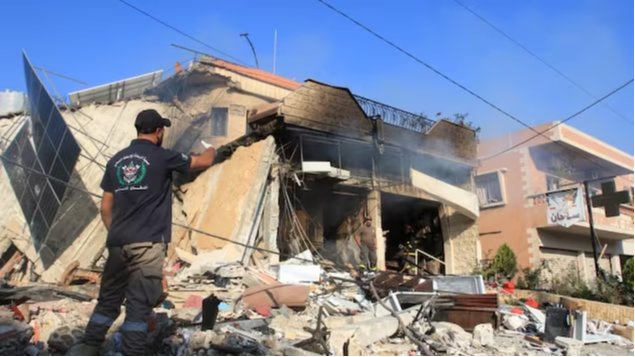
A rescuer inspects the debris at the site of an overnight Israeli strike on a pharmacy in the southern Lebanese village of Akbiyeh on Tuesday. Israel announced dozens of new air strikes on Hezbollah strongholds in Lebanon a day after a massive, deadly bombardment. (Mahmoud Zayyat/AFP/Getty Images)
Washington, September 26 (RHC)-- The United States, France and several Arab and European countries have called for an immediate 21-day ceasefire across the Israel-Lebanon border following intense discussions at the United Nations.
The pause in hostilities would apply to the Blue Line, the demarcation line between Lebanon and Israel, and would allow the warring parties to negotiate towards a potential diplomatic resolution of the conflict, according to Al Jazeera’s Rosiland Jordan, reporting from Washington, DC, quoting US officials who briefed reporters late on Wednesday.
“We call on all parties, including the governments of Israel and Lebanon, to endorse the temporary ceasefire immediately,” read a joint statement by the countries, which was released on Thursday by the White House.
UN Secretary-General Antonio Guterres told an emergency United Nations Security Council meeting that “hell is breaking loose” in Lebanon, adding that an all-out war must be avoided “at all costs.” “To all sides, let’s say in one clear voice: Stop the killing and destruction, tone down the rhetoric and threats, and step back from the brink,” he said.
Those joining the U.S. and France in calling for a halt to the conflict are Qatar, Australia, Canada, the European Union, Germany, Italy, Japan, Saudi Arabia and the United Arab Emirates.
There was no immediate reaction from the Israeli or Lebanese governments – or Hezbollah – but senior U.S. officials quoted by The Associated Press news agency said all parties were aware of the call for a ceasefire.
Israeli Prime Minister Benjamin Netanyahu, heading to New York to address the UN, said he had not yet given his response to the ceasefire proposal and had instructed the army to fight on.
“The news about a ceasefire – not true. This is an American-French proposal, to which the prime minister did not even respond,” his office said on social media platform X.
“The news about the supposed directive to moderate the fighting in the north is also the opposite of the truth. The Prime Minister instructed the [army] to continue the fighting with full force, and according to the plans presented to him,” it added.
Israeli opposition leader Yair Lapid called on the government to accept the proposal – but only for seven days. Even the slightest violation of such a ceasefire would push Israel to restart its attacks with “its full force … in all areas of Lebanon”, said Lapid in a series of posts on X, adding that “we will not accept any proposal that does not include removing Hezbollah from our northern border.”
Israeli Finance Minister Bezalel Smotrich, who heads one of two nationalist-religious factions in the governing coalition, said Hezbollah should be crushed and that only its surrender would make it possible for the Israeli evacuees to return in the north near the Lebanese border.
“The enemy must not be given time to recover from the heavy blows he received and to reorganise for the continuation of the war after 21 days,” he said in a statement.
Reporting from Marjayoun, Lebanon, Al Jazeera’s Imran Khan said there was no trust in Lebanon that “the Americans or indeed anyone can actually rein in Israel.”
“They always point to the U.S. military assistance that Israel gets – $3.5 billon a year. Since October 8th last year, emergency appropriations of about $21 billion. That level of U.S. support for Israel doesn’t make the U.S. an honest broker. There is going to be a lot of cynicism about this particular ceasefire statement,” he said.
Hezbollah’s position has been clear from the start – it will not agree to a ceasefire as long as there is a war in Gaza, Khan said.
The U.S. officials said Hezbollah would not be a signatory to the 21-day ceasefire but believed the Lebanese government would coordinate its acceptance with the group.
French Foreign Minister Jean-Noel Barrot told the council that “we are counting on both parties to accept it without delay” and added that “war is not unavoidable”.
At the same meeting, Najib Mikati, the Lebanese prime minister, backed the French-US plan that “enjoys international support and which would put an end to this dirty war.” He called on the council “to guarantee the withdrawal of Israel from all the occupied Lebanese territories and the violations that are repeated on a daily basis”.

